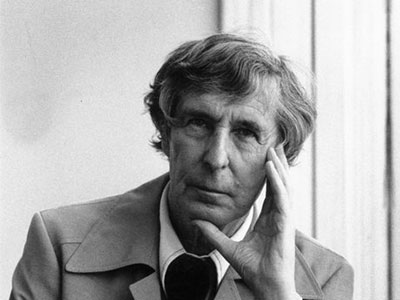
Michael Tippett
(born London 2 January 1902; died Isleworth, Middlesex 8 January 1998)
Alongside Britten, Tippett remains one of the key British composers of the post-war era. The two men were friends from 1942, and both were pacifists and homosexuals. However, unlike Britten, Tippett’s career was a slow burn and it took him until his fifties to establish his reputation. Tippett’s five operas – all to his own librettos – reflect his changing directions as a composer as well as his wide-ranging musical and extra-musical interests in what proved to be a long creative life.
Tippett's Musical Style
The voluptuous musical language of Tippett’s concert music (e.g. the Concerto for Double String Orchestra, and the Corelli Fantasia) characterises his first opera, The Midsummer Marriage, premiered at Covent Garden in 1955, with designs by Barbara Hepworth. Its metaphor-rich, poetic libretto puzzled its first audiences (as it did some of the singers involved) but there was no doubting the power of Tippett’s visionary voice.
Tippett developed a tougher, more brittle musical style in his Second Symphony (1958), which he completed shortly before embarking on his second opera, King Priam, a familiar story from Homer’s Iliad. Concerned with war and the consequences of violence, the subject-matter fitted Tippett’s sparser musical language like a glove.
His later operas – The Knot Garden, The Ice Break and New Year – have yet to establish themselves in the repertoire. While The Knot Garden explores personal relationships in a private world, The Ice Break returns to the public arena, the action clearly taking place in the United States (though the location is not specified). It reflects the composer’s fascination for America, referencing rock musicals, black power and soap opera among others. New Year, whose sci-fi subject matter was influenced by television, recalls the lyrical ecstasy and rhythmic vitality of his earlier music.
Tippett's Life
Tippett grew up in Suffolk (something else he had in common with Britten). His parents were a mix of the conventional and unconventional – for example, his mother was an artist and novelist, and closely involved in the suffragette movement. Though he received no formal musical training other than piano lessons, he knew from an early age that he would be a composer, and in 1923 enrolled at the Royal College of Music to study composition, conducting and piano. An artist with committed socialist principles and strong pacifist beliefs, Tippett spent a period in the early 1930s organising music at a work-camp for the unemployed and was also associated with the London Labour Choral Union. His first operatic projects date from the 1930s and include a version of The Beggar’s Opera and a folk opera entitled Robin Hood.
Kristallnacht, the horrific Nazi pogrom of the Jews in 1938, provided Tippett with the subject for what was to prove his break-through piece, the oratorio A Child of Our Time (1939–41), which is celebrated for its use of Afro-American spirituals in the manner of the chorales in Bach’s Passions as well as for the influence of Jungian analysis.
Notable Operas
- The Midsummer Marriage (1946–52)
- King Priam (1958–62)
- The Knot Garden (1966–9)
- The Ice Break (1973–6)
- New Year (1985–8)
